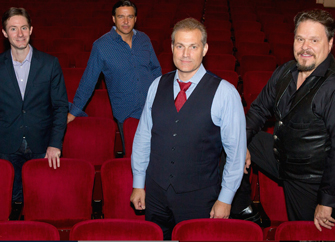
The show is called Baritones Unbound, but who first erected those boundaries? Was it the age of Romanticism that declared all heroes had to be young, blond and sing in tenor range? Was it the memory of the family patriarch's authoritative tones that rendered chest-based vocalizations the province of elders and villains? And when twentieth-century values bestowed heroic status upon men of worldly experience, was it the sexual threat implied in their soothing intonations that made parents wary of teen idols like Frank Sinatra, Elvis Presley and Jim Morrison?
Whatever the impulse spawning an abundance of concert programs like The Three Tenors, Three Mo' Tenors, The Ten Tenors, Three Tenors and a Soprano, The Irish Tenors, The Canadian Tenors, Les Contre-Tenors and at least one classically-trained trio of you-know-whats every year on America's Got Talent, Marc Kudisch thinks it's about time for the baritones to get their moment in the spotlight.
What led Kudisch to provide an addendum to his show's title—"Celebrating the UnCommon Voice of the Common Man"—was the popular definition of "baritone" as "the most common of male voices." Discovering that the majority of men do, indeed, have voices in that range, was only part of the story, however. "The baritone was the last to be acknowledged as a distinct vocal category," explains Kudisch, "but even more important was the particular character associated with it, and his emotions, challenges and triumphs. In art, baritones are always the innovative personalities questioning the status quo."
So why haven't the baritones demanded their due before now? "Throughout history, the tenors and sopranos have always been the exalted gods and goddesses, while the baritones were the workmen, the storytellers, the foils, the ones who move the plot forward—not exactly tasks designed to generate mass adulation."
Hershey Felder booked you at the Royal George—how did he find you and why did he think you'd be right for Chicago? "Hershey and I both believe that performance includes a conversation with an audience actively involved in the evening's program. Chicago is always ready for a good argument. It knows how to actually listen and then feel whatever it wants to feel."
Even divided among three warblers, two hours of singing makes for a lot of strenuous throat exercise, forcing Kudisch and his fellow vocalists [Nathan Gunn and Mark Delevan] to exercise caution to take special care of their vocal apparatus. "The singing is the easier part, really, because our technique is in place," Kudisch assures me, "The challenge is covering six hundred years of widely-differing musical styles—and then there's the talking! You sometimes completely forget that speaking requires technique, too. And lots of Ricola."
So what are audiences to expect from Baritones Unbound? "What you will NOT get is a show like The Three Tenors. We are not a boy-band. We are a brotherhood, sharing our heritage with each other and with you. This is the music that you love and that you know, along with the story that you didn't know!"
Baritones Unbound runs at the Royal George Theatre from December 11 through January 3.
Mary Shen Barnidge
Contributing Writer

 Follow Us On Twitter
Follow Us On Twitter